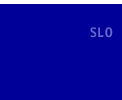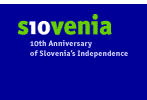 |
 |
|||||||||||
|
||||||||||||

|
|
|
"Slovenians were looking for a way out of Yugoslavia's fundamental conflict, which was a conflict between a totalitarian and a democratic concept of the future. Since we were aware of the fact that the process of disintegration of Yugoslavia could veer onto the path of great violence and war, Slovenians proposed various formulae for peaceful solutions. First, a reform of the federal structure of the state, then a confederate system as a possible transitional period, and finally a proposal for the dissolution of Yugoslavia by peaceful means. All Slovenian proposals were arrogantly rejected and this led to an independent Slovenia, justified by the will of the people expressed at the plebiscite. This act, this act of our nation, materialised our right to self-determination and it did not infringe on that same right of any other nation. Our proposals, laid down already in the Charter of Good Intent at the time of the plebiscite and later in the decisions of the Assembly of 25 June 1991 on the dissolution of the common state, attempted also to protect other nations and other constituent republics, so as to disassociate by peaceful means and through negotiations," reminisces the then President of the Presidency of the Republic, now President of Slovenia, Milan Kucan. "I also found it sensible and necessary to convince the crucial figures in international politics not to act based on 'staunch circumstances', instead to act on the basis of real facts. To therefore recognise the fact that Yugoslavia is no more and for their activity to contribute to the process of disintegration not to proceed unbridled, but with direction and supervision", remembers President Kucan. "Due to internal contradictions Yugoslavia practically ceased to exist. It no longer functioned as a state and was no longer capable of responding to the changed historical circumstances once the block division of the world was overcome," estimates President Kucan, adding that "Slovenians and Croats, and increasingly so also other nations, no longer recognised Yugoslavia as their own state." The President of the Republic, Milan Kucan, who was in Slovenia's leadership at the time of the Slovenian 'political spring', at a time when movements in support of democratic values of a modern open society were gaining in importance and when Slovenian resistance to the regime symbolised by Slobodan Milosevic began, says: "Yugoslavia was a futureless vessel void of values; it was governed by violent nationalism and Serb hegemonism. With the wave of civil movements supporting the rule of human rights, which came thrashing over the highly guarded eastern borders and flooded the spiritual environment of Central and Eastern Europe Slovenia, too, received recognition for its way of life and thus also support for its independence plan." At the plebiscite in December 1990 Slovenians and other citizens of the Republic of Slovenia unanimously decided in favour of an independent state. Over 93% of the electoral body cast their vote, of which 88% voted in favour of an independent Slovenia. The plebiscite is therefore a symbol of great national unity. "The plebiscite was recognised as a democratic act of the Slovenian nation, which the international community could not overlook", says the then President of the republic's Presidency. "The independence movement was not a game on the part of politicians. It was an all-out popular movement, which turned into a liberation movement during the armed conflict. There is simply no way of subordinating such a movement." President Kucan particularly points out the legal fact that "independence was achieved by virtue of dissolution, not secession. Thus Slovenia followed in the logic of its historical decisions on voluntary association into the first and second Yugoslavia, in 1918 and at the second AVNOJ session in 1943 respectively, as well as a host of constitutional decisions in the erstwhile common state. This also made possible its status of equal partner at the peace conference on Yugoslavia in Brussels, in negotiations on the legal succession to the former Yugoslavia, as well as an active position in demands for the fulfilment of obligations arising from the Osimo treaties with Italy, for the legal regulation of open issues with the Republic of Croatia, including the border at sea, and in enforcing succession to the Austrian State Treaty." "In war, it is always also the moral factor that decides. That factor was undisputedly on Slovenia's side. Slovenians were defending a democratic decision, freedom, dignity and the historical heritage of our forefathers. We neither hated nor hurt anyone. The adversary had no moral justification for aggression, nor did he have a reason to hate Slovenians. Most soldiers and officers of the JNA also behaved that way in the conflict. The JNA was neither motivated nor ready for war. We, however, had all that and that was our big advantage, in spite of the great military force on the opposite side. That is what decided the armed conflict," assesses President Kucan today. An assessment of the significance of the Brioni negotiations for Slovenia: "The Brioni Agreement meant a de facto end of the war, it also meant the international recognition of Slovenia. At that time Slovenia appeared for the first time as an independent entity in a document of international law. That document recognised Slovenia's achievement on its path of independence and in essence only required a postponement of further steps towards independence for a period of three months. The agreement ensured that the Yugoslav Army did not return to border crossings, it ensured that Slovenia's border with Austria, Italy and Hungary became a European border and that the flag of the European Union flew alongside Slovenian flags on that border. That was a very important confirmation of all that we had strived for during all that time while seeking solutions for a peaceful outcome of the Yugoslav crisis." |


